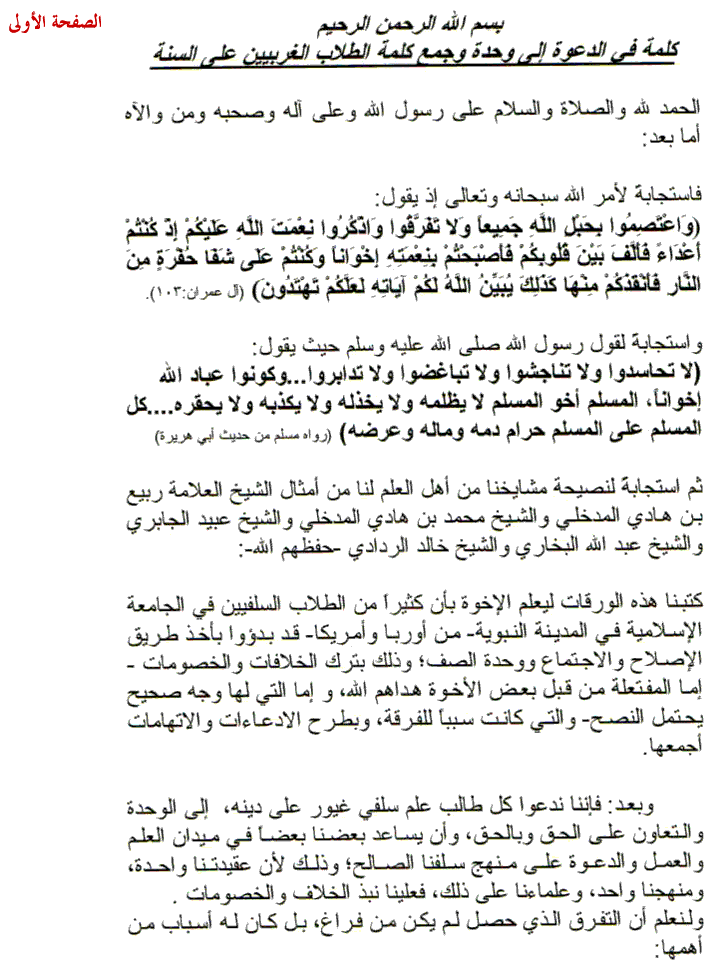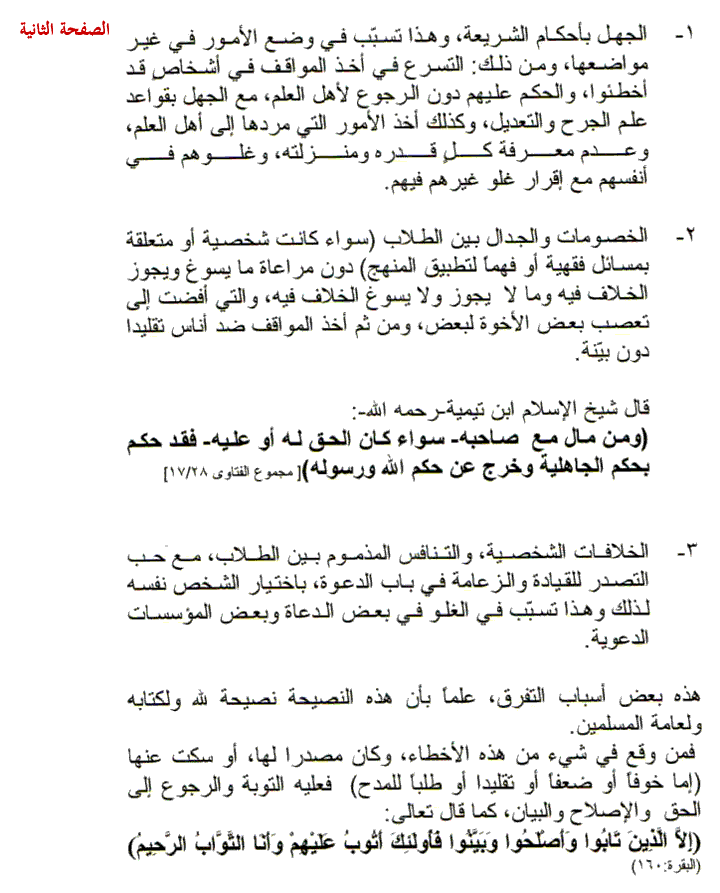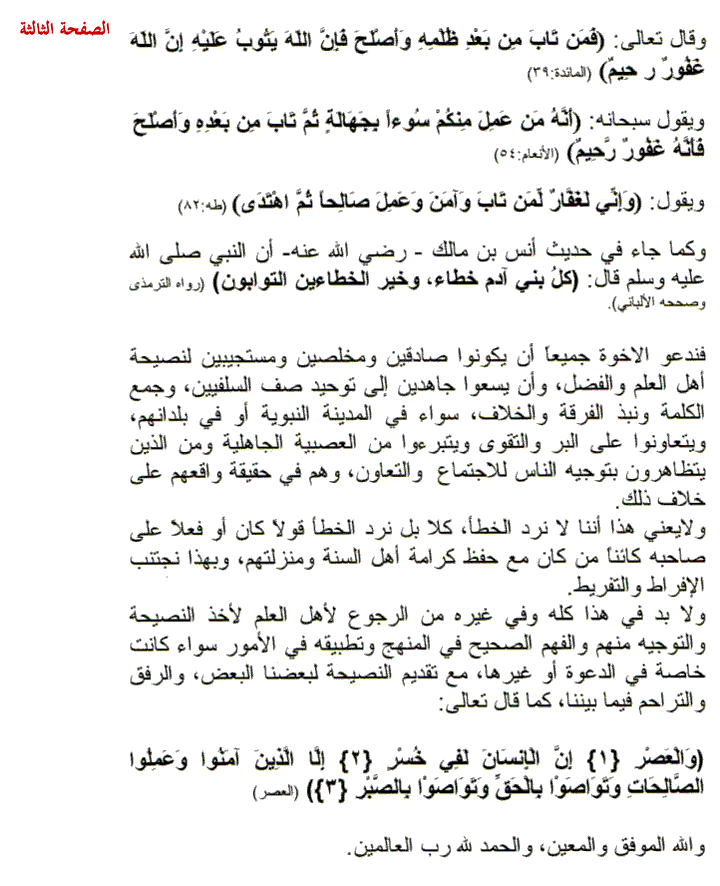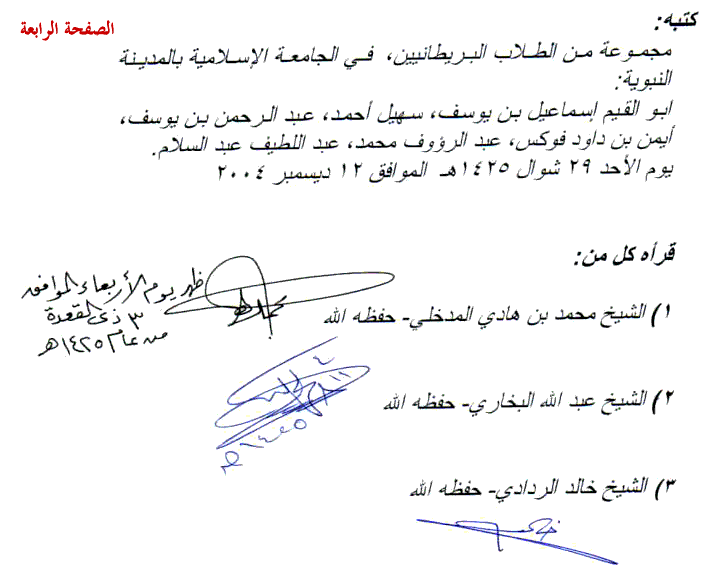| NEWS\
Friday
17 December 2004 |
A
Call to the Unification of the Western Students upon
the Sunnah
Source:
http://www.madeenah.com/index.php?option=com_content&task=view&id=22&Itemid=2
All
praise is for Allah, and peace and blessings be upon our
Prophet Muhammad, his family and his companions and those
who have alliance to him, to proceed:
So in response to the command of Allah the Perfect, the
Most High, where He states (the meaning of which is):
“And hold fast, all of you together, to the Rope of
Allah and be not divided among yourselves and remember Allah’s
favour on you, for you were enemies one to another but He
joined your hearts together, so that, by his grace, you became
brothers and you were on the brink of a pit of fire and He
saved you from it. Thus Allah makes His Ayaat clear to you,
that you may be guided.” (Al-Imran: 103).
And in adherence to the statement of the Messenger of Allah
Sallahu Alahi Wasallam where he states:
“Do not envy one another, do not increase prices one
to another (by bidding for something that you do not intend
to buy), do not hate one another and do not turn away from
one another…. and be, O slaves of Allah, brothers.
A Muslim is the brother of a Muslim, he neither oppresses
him nor does he disgrace him, he neither lies to him nor
does he hold him in contempt…. the whole of a Muslim
for another Muslim is Haraam (inviolable and forbidden),
his blood, his property and his honour.” (Related by
Muslim from the hadith of Abu Huraira).
Then acting in accordance to the advice given to us by our
scholars from the people of knowledge, from the likes of
Ash-Shaykh, Al-'Allaamah Rabee' bin Haadee Al-Madkhalee,
Shaykh Muhammad bin Haadee Al-Madkhlee, Shaykh 'Ubaid Al-Jaabiree,
Shaykh 'Abdullah Al-Bukhaaree and Shaykh Khaalid Ar-Raddaadee (may Allah preserve them all):
We
have written these papers in order to inform the brothers
that many of the students at the Islamic University
of Medina (from Europe and America) have now begun to take
the path towards rectification and unity, by way of abandoning
differences and disputes that caused them to split and by
rejecting and totally casting aside all claims and accusations
(that were either fabricated by some of the brothers-may
Allah guide them- or the differences and disputes had a correct
point of view that held the possibility of advice being given).
So
we call every student of knowledge, who is earnestly
concerned
about his Deen, to unity and co-operation upon
the truth and with the truth and to aid one another in the
field of knowledge, action and giving da’wah upon the
manhaj of our Pious Predecessors. That is because our Aqeedah
is one, our Manhaj is one and our Scholars are upon that.
So it is upon us to discard the differences and disputes
and for us to know that the splitting that occurred was not
void of any reasons, rather from the most important of them
were:
1. Ignorance
with regards to the rulings of the Sharee’ah which
resulted in affairs being placed in other than their
correct places. From amongst these affairs: hastiness
in taking position’s against individuals who may
have fallen into error and passing judgment upon them
without first referring to the scholars, whilst being
ignorant of the principles of the science of Jarh Wa
Ta’deel. This likewise being a result of taking
on board affairs that should by right have be returned
to the people of knowledge and due to each individual
not knowing his own level and his manzilah (place) along
with having Ghuloo (exaggeration) in themselves and accepting
others having Ghuloo in them.
2. Disputes and arguments between students (whether they
were personal or relating to issues of fiqh or concerning
the understanding of the correct implementation of the manhaj),
without taking into consideration what types of differences
are allowed and permissible and what types are not. Which
as a result lead many of the brothers to have Ta'assub (partisanship)
for one another and to take positions against people based
upon blind following and not upon clear evidences or proofs.
As Shaykh-ul-Islaam states:
“Whoever leans towards his companion-regardless of
whether the truth is for him or against him-has indeed judged
with the ruling of Jaahiliyyah and has left the judgment
of Allah and His messenger.” (Majmoo'ul-Fataawa, vol:
28-p.17).
3.
Personality differences and the type of student rivalry
which is blameworthy,
along with the love of putting oneself
forward for leadership in the affairs of the Da’wah,
all this being done by way of an individual appointing himself
for that purpose, which in turn has lead to the occurrence
of Ghuloo in certain du’aat (callers) and in certain
da’wah organizations.
The above are but some of the reasons behind the splitting,
bearing in mind that this advice is for the sake of Allah,
to His book (to believe in it and act upon it) and to the
Muslims in general. Therefore it is upon the one who fell
into any of these errors or was the root cause of them, or
remained silent in the face of them (either out of fear,
weakness, due to blind following or seeking praise), then
it is upon him to repent, return to the truth and make rectification
and bayaan (clarification), as the Most High says (the meaning
of which is):
“Except those who repent and make the rectification
and openly declare the truth, these, I will accept their
repentance. And I am the one who accepts repentance, the
Most Merciful.” (Al-Baqarah: 160).
And He the Most High states (the meaning of which is):
“Whosoever repents after his crime and does righteous
deeds, then verily, Allah will pardon him, verily Allah is
Oft-Forgiving, Most Merciful.” (Al-Ma’idah: 39),
and:
“…So that if any of you does evil in ignorance
and thereafter repents and does righteous deeds, then surely,
He is Oft-Forgiving, Most Merciful.” (Al-An’aam:
54), and:
“And verily, I am indeed forgiving to him who repents,
believes and does righteous deeds and then is guided.” (Ta-Ha:
82).
And as occurs in the hadith of Anas bin Maalik, where the
Messenger of Allah (Sallahu Alaihee Wasallam) said:
“All
of the children of Aadam make mistakes and the best
of those who make mistakes are those who repent.” (Related
by At-Tirmidhee and authenticated by Shaykh al-Albaani).
So
we call upon all the brothers to be truthful, sincere and
to respond to the advice of the people of knowledge and
virtue and that they should strive towards uniting the ranks
of the students and abandoning splitting and differing. Whether
that be in Madinah or in their own countries and that they
should co-operate with one another upon righteousness and
piety and to free themselves from the partisanship of the
days of jahiliyyah and from those who pretend to direct the
people towards unity and co-operation, whilst in reality
their affair is in opposition to that.
However this does not mean that we do not refute errors
that are made, rather we refute the error of an individual
(whomsoever it may be) be it in statement or in action, whilst
at the same time preserving the honour of Ahlus-Sunnah and
their manzilah. By this, we will avoid the two extremes,
the extreme of exaggeration and the extreme of compromising
and falling short.
And it
is imperative in this and other than this, that we return
back to the
scholars in taking advice and guidance
from them and likewise the correct understanding of the manhaj
and its application in matters, whether they are specifically
related to the Da’wah or other than it. Along with
offering advice to one another and having gentleness and
mercy towards one another, as He the Most High says:
(the meaning of which is):
“By time, all of mankind is in a state of loss, except
those who believe and do righteous deeds and advise one another
with the truth and advise one another with patience.” (Suratul-Asr).
And Allah is the One who grants success and aid, and all
praise is due to Allah.
Written by the following British students from the Islamic
University of Madeenah:
Abul-Qayyim
Ismaa’eel
bin Yusuf, Suhail Ahmad, 'Abdur-Rahmaan bin Yusuf, Ayman
bin Dawood Fox, 'Abdur-Raoof Muhammad and
'Abdul-Lateef 'Abdus-Salaam.
Sunday
29th Shawaal 1425-corresponding to-12th December 2004. Read by each of the following scholars:
Shaykh Muhammad bin Haadee Al-Madkhalee;
Shaykh 'Abdullah Al-Bukhaaree;
Shaykh Khaalid Ar-Raddaadee.
Note: The Arabic text below contains the signatures of the
aforementioned scholars.




|



